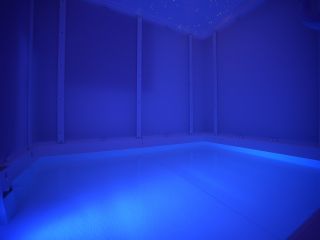Consciousness
Floating Happily Without a Sense of Time or Self
Body and time dissolve during exposure to Floatation-REST.
Updated May 1, 2024 Reviewed by Gary Drevitch
Key points
- Altered states of consciousness are characterized by changes in the senses of self and time.
- Floatation-REST is a technique in which one weightlessly floats in salt water heated to skin temperature.
- Our study participants experienced a loss of body boundaries and subjective time during Floatation-REST.
- The dissolution of body boundaries during Floatation-REST led to a decrease in anxiety.

Our senses of self and time are tightly coupled. This is clearly sensed in the contrasting states of boredom and flow. When we are bored, we are highly self-aware and time drags. In states of entertainment-induced flow, such as when individuals play a video game, time passes very quickly. We are absorbed in the activity and no longer pay attention to ourselves. Since subjective time is closely linked to body feelings, the degree of attentional focus on the self in a given situation influences the sense of time passage, as I discussed in an earlier post.
Altered states of consciousness, as induced through psychological techniques such as meditation or the use psychopharmacological substances, cause strong distortions of the self and distortions in judgments of time, as I wrote in my book, Altered States of Consciousness. In contrast, the senses of self and time are overly represented in individuals with anxiety and depression (Vogel et al. 2018). They are stuck with themselves in time and are in extremely negative emotional states. The core features of intensive flow states thus oppose these psychiatric symptoms. Altered states of consciousness induced by mindfulness meditation practice or the intake of psychedelics – within the framework of a psychotherapeutic setting – could thus help alleviate symptoms in certain psychiatric patient groups, as has been shown in clinical studies, such as discussed in an earlier post here.
One technique to induce altered states of consciousness is Floatation-REST (Restricted Environmental Stimulation Therapy). In the Floatation-REST method, one lies weightless in a floating cabin in body-warm salt water that supports the body. No light penetrates the inside and no external sound can be heard. At the beginning of a float session, one feels the breathing, the muscles, the heart, processes inside the body. However, the boundary between air, body, and water disappears, and suddenly the person floating can no longer discern where their body begins and where it ends. I like to call the effects of Floatation-REST “instant meditation” as it leads to states that only experienced meditators can achieve.
This is what Floatation-REST can do to patients with anxiety and depression: Clinical neuropsychologist Justin Feinstein, now President and Director of the Float Research Collective, together with his colleagues from the Laureate Institute for Brain Research in Tulsa, Oklahoma, had exposed 50 patients with anxiety and stress-related disorders to a Floatation-REST session. The majority of patients reported reductions in stress, pain, and depression, and improvements in relaxation, happiness, and overall well-being. Additional analyses revealed that the most severely anxious participants actually reported the largest effects.
In a study just published in the journal Scientific Reports, my colleagues and I furthermore investigated the relationship between altered states of consciousness and its association with affective changes induced by Floatation-REST. In 2022, my lab at the Institute for Frontier Areas of Psychology and Mental Health installed a Floatation-REST cabin located in the health practice Prana in Freiburg, a “cabin for two” built by Floataway. In our first study, which is part of Helena Hruby’s doctoral thesis at the Medical School, University of Freiburg, under the supervision of Stefan Schmidt, we compared the reports of 50 healthy individuals after they experienced subsequently 60 minutes of Floatation-REST and 60 minutes of Bed-REST. As control condition, we used a warm waterbed that entailed lying supine in a dark and quiet room.

In both REST conditions, subjects reported less arousal and tension, as well as lower anxiety and stress levels, after the 60-minute experience than before. Importantly, however, following Floatation-REST as compared to following Bed-REST, subjects felt significantly more relaxed and less anxious. Regarding the induction of altered states of consciousness, Floatation-REST induced a stronger dissolution of body boundaries and a stronger distortion of subjective time. Since we wanted to know about the specific effects of altered states on psychological well-being, we also looked at these relationships. We found that the loss of body boundaries led to a downregulation of anxiety, thus providing evidence on a novel mechanism by which Floatation-REST can exert an anxiolytic effect. Given the limitations of current treatment approaches for depression and anxiety disorders, there is a great need for and interest in complementary therapeutic approaches. Floatation-REST could present such a therapeutic approach with the advantage of causing no or minimal side effects.
Floatation-REST is a safe method to induce altered states of consciousness and thus explore the mechanisms of consciousness. As I have remarked before, for a long time extraordinary consciousness experiences were either ignored by the mainstream natural sciences or explicitly denigrated. But times are changing. As one method for inducing altered states of consciousness, Floatation-REST could become an established scientific tool to study the foundations of phenomenal consciousness, one of the biggest mysteries of mankind.
References
Feinstein, J. S., Khalsa, S. S., Yeh, H. W., Wohlrab, C., Simmons, W. K., Stein, M. B., & Paulus, M. P. (2018). Examining the short-term anxiolytic and antidepressant effect of Floatation-REST. PloS One, 13(2), e0190292.
Hruby, H., Schmidt, S., Feinstein, J. S., & Wittmann, M. (2024). Induction of altered states of consciousness during Floatation-REST is associated with the dissolution of body boundaries and the distortion of subjective time. Scientific Reports, 14(1), 9316.
Vogel, D. H., Krämer, K., Schoofs, T., Kupke, C., & Vogeley, K. (2018). Disturbed experience of time in depression—evidence from content analysis. Frontiers in Human Neuroscience, 12, 66.
Wittmann M. (2018) Altered States of Consciousness. Cambridge, MA: MIT Press.


